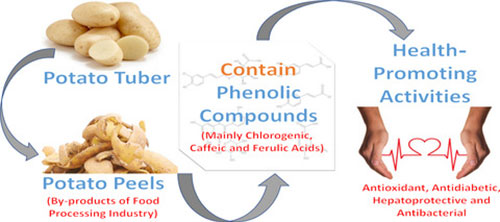Research identifies glycoalkaloids, phenolic compounds in potatoes
A study published in the journal Food Science and Human Wellness found that processing potatoes removes most of their nutrients. The study quantified glycoalkaloids and phenolic compounds in potatoes.

Researchers from China looked at the nutritional profile and overall food safety of potatoes. They quantified the glycoalkaloids and phenolic compounds in three potato varieties, such as Russet Burbank, Atlantic, and Shepody, as well as in commercially dehydrated potato flakes, which are used in making products such as mashed potatoes and potato chips.
Glycoalkaloids and phenolic compounds are mostly found in the peels and adjoining tissues of potatoes. Glycoalkaloids are potentially toxic compounds that naturally occur in potatoes. The major glycoalkaloids in potato are alpha-chaconine and alpha-solanine.
The researchers found that a whole potato contains between 4.72 milligrams per kilogram (mg/kg) and 34.45 mg/kg of total glycoalkaloid levels.
The major glycoalkaloids in potato are alpha-chaconine and alpha-solanine.
Chlorogenic acid is the major phenolic compound in Russet Burbank potatoes, while Atlantic and Shepody potatoes contain caffeic acid.
The ratio of alpha-chaconine to alpha-solanine in whole potatoes ranged from 0.41 for Russet Burbank potatoes to 3.61 for Atlantic potatoes.
During dehydrated potato flake processing, which includes washing, steam peeling, slicing, washing, blanching, cooling, cooking, mashing, drum drying, flaking, and packaging, the Russet Burbank variety lost 90 percent of its total glycoalkaloid content and 50.47 percent of its phenolic compounds.
In conclusion, potatoes lose their glycoalkaloids and phenolic compounds when they are processed.
yogaesoteric
March 7, 2020
